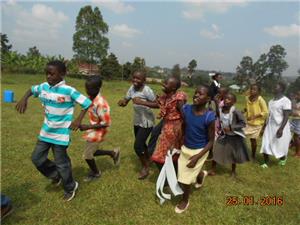
Sunshine, fun, games and handicrafts...
Each day during the program we invited children according to their age groups and spent half the day with them. In our preparation we thought of different games, challenges and talks.
Every day we started with a mindfulness exercise, to get to know the room, focus on our bodies and minds and invite the children and youth to feel comfortable.
After that we made a short introduction game, that Arinda knew from Germany, like the Spidernet (Someone says his name and future dreams and then throws a thread to another person, but he keeps holding a part of the thread. So a spidernet can develop and connects everyone in the circle).
We thought this short connection wasn't enough to get to know the group, so we started some cooperation games, where the children could succeed only as a whole group.
After that, we became active and creative: We played Sports, had Competitions, did some Baking, made Handicrafts, like bookmarks and bangles, and then we gave different short talks about life skills, career guidance and becoming an adults.
As St. Francis has a policy of having a “Litter Free Compound” and as the roads around our compound had been littered by a graduation party of the previous week, we were requested to clean up the rubbish. We turned this into a really fun game. We introduced a “live” puppet from Germany, called Vicky. She (played by Johanna) told the 5 to 10 year old children a short story about a magical Spring that would heal every diseases, including the illness of the father of a brother and sister. But before they could get the magic water they had to clean up the magical spring, that was littered with rubbish. We invited the children to be like the two children in the story and tidy up St. Francis. To make it more interesting, we made a small competition: The one gathering the most rubbish would get a little surprise! How energetic the children were to clean up the compound and the street, was amazing to see and also how they wanted to be the best! In the end, the winner got two sweets, the others one. For them it was also good, that we staff collected with them, as it strengthened our relationships with them.
Another highlight with these two groups was the baking of German sweet bread. The children enjoyed mixing the ingredients and kneading the dough. And of course – eating what they baked afterwards was the best part and it tasted delicious!

We didn't only do sports like soccer, volleyball, jumping over ropes etc., we also had a great competition with different activities like a tasting-station, balancing passion fruits on spoons, picking the soap with toes out of a water bucket.
With the older groups from 12-22 years we held discussions about different important topics related to their actual live situations: We talked about different life skills with the first group from 12-15 years. In order to understand the term “life skills”, they were asked to think of examples and cluster them into categories, like personal, interpersonal, communication and cognitive skills. We recognised, at one point, that some of the talk was much too heavy and that children were too shy to speak out. So we first did some movement exercises, had some fun and then introduced the topics. This turned out to be a good decision.

The second group from 14-18 years were much more open and communicative about the topic “career guidance”. The exchange of personal experiences and ideas in small groups were especially fruitful. We even prepared a newsprint with different steps to be followed for a career, starting with visions and dreams, ending with a “Step-by-Step-Process”. But nothing topped the last talk about “becoming adults” with the young adults from 18-22 years. They chose one scene we prepared and transferred it into a short role play. One group played a family in which the daughter rebelled against the mother, but later on could see the mother’s point of view. Another group dramatised what happened to different classmates, both those who were attentive and those who didn't want to learn. A third group chose a scene in the bank, where a bank manager counselled young adults about how to deal with their earned money and how to save it. We were very surprised and impressed by how much knowledge the young woman had about handling finances! We think that a lot new information seeped into the minds of our youth.
But beside these serious talks we wanted the youth and young adults to take something home, so we decided to have a bangle making exercise for themselves, for friends or family. Everyone could choose to write either a name or other words with colourful beads on the bracelets. Eating popcorn and listening to music created a comfortable and relaxing atmosphere.

At the end of each day we made a short evaluation with the groups to know, what they liked or wished to have been different. It was good, that everyone said at least one short sentence. This participation helped us to individualise the plans for the different groups.
Some readers might take all this to be very normal with children. This is not the case in Uganda. Often these children do not get a chance to play and to have fun with adults. In many instances they do not have the opportunity to dialogue with listening and attentive adults. Sometimes their school holidays consist of working at home cooking, fetching water, firewood or going around looking for holiday work to make some money. There is a great shortage of such jobs for the huge numbers of youth in Uganda.
All in all the holiday program was interesting, wild, varied and enjoyable and we hope the next one will be even better!
Greetings from Sr. Catherine, Arinda, Johanna and Kevina
